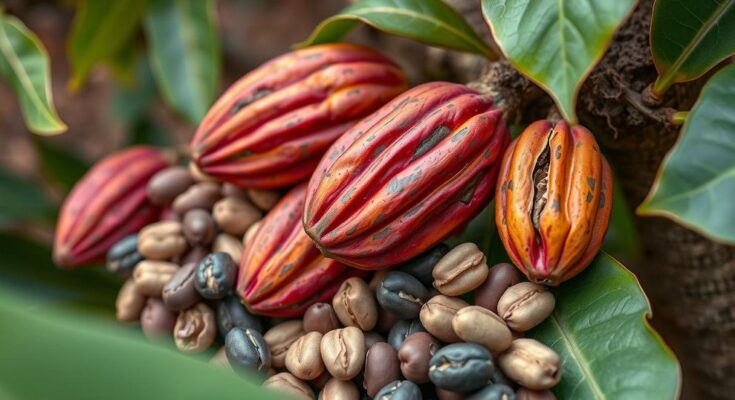Cocoa futures have surged by 175% this year, nearing $11,570 per ton, due to poor yields in African nations. Weather challenges and diseases in major cocoa-producing countries, particularly Ghana, have created significant supply issues, resulting in a potential third global shortfall. The International Cocoa Organization warns of further deficits ahead, highlighting cocoa’s market strength amidst contrasts with other commodities like sugar and coffee.
Cocoa futures have gained exceptional momentum in recent months, witnessing a significant uptick of 175% in New York due to adverse crop conditions in Africa’s key cocoa-growing regions. The price of cocoa futures jumped to $11,570 per metric ton, driven primarily by supply chain challenges including swollen shoot disease, aging trees, and climate effects specifically impacting Ghana, one of the largest cocoa producers. The current upward trend reached a peak price of $12,931 per ton on December 18, 2023, indicating remarkable profit potential for investors. The International Cocoa Organization has reported a continuing global shortage in cocoa production for the third consecutive season, raising further concerns about potential deficits in the upcoming year. Similarly, London cocoa futures are also expected to record a robust annual increase of 160%, even though they experienced a minor dip recently.
The cocoa market is under scrutiny as its prices surge dramatically due to production difficulties in West Africa, a region that plays a crucial role in global cocoa supply. The issues of swollen shoot disease and the aging of cocoa trees, compounded by the effects of climate change, have severely limited output in countries like Ghana. As the demand for cocoa increases, this scarcity poses serious implications not only for the chocolate industry but also for broader food security concerns and sustainable agricultural practices across the region.
In summary, cocoa prices are anticipated to significantly impact commodity markets through 2024, demonstrating a stark contrast with other commodities currently facing oversupply challenges. The ongoing crop yield problems underscore the potential for food security crises, exacerbated by climate change. Investors should remain vigilant to the growing economic implications surrounding cocoa and consider its performance relative to other agricultural products affected by adverse weather conditions and market dynamics.
Original Source: finimize.com




